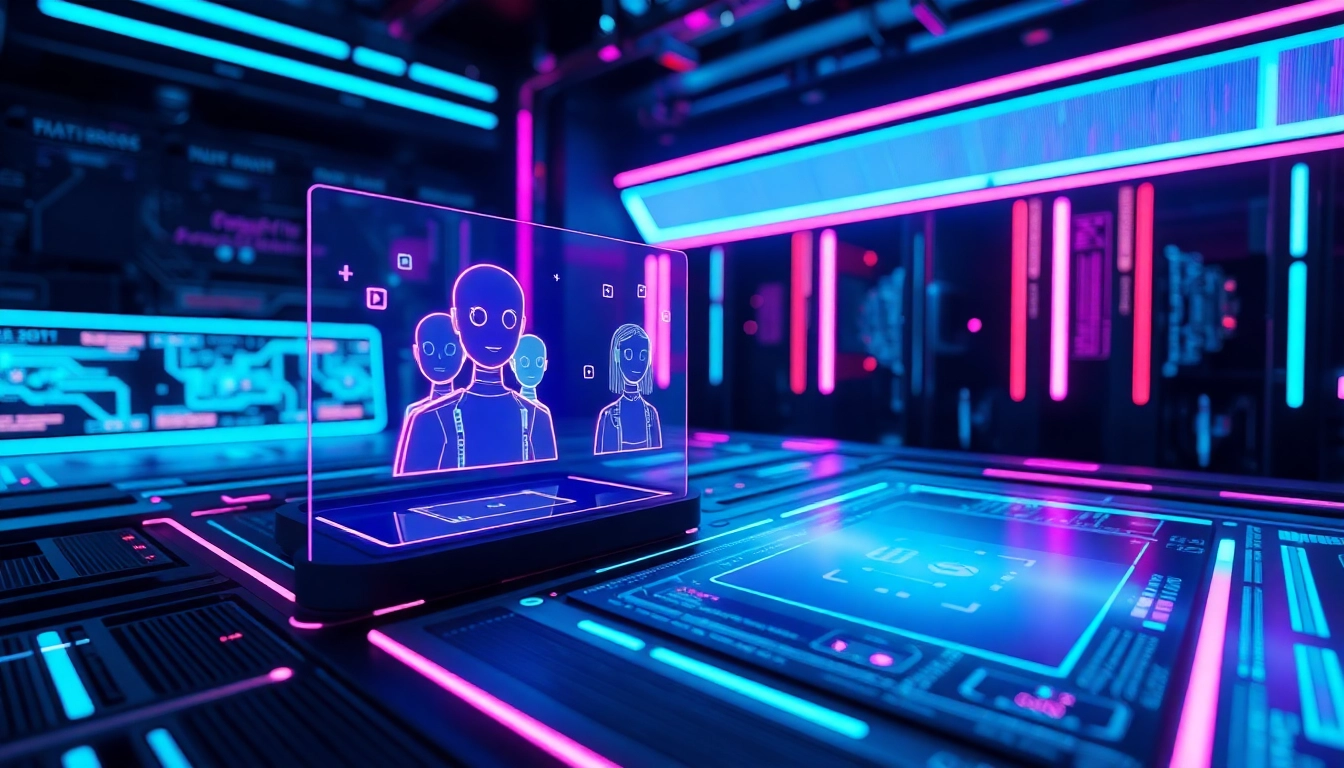Introduction: The Evolution of AI Characters and Their Cultural Significance
In recent years, the landscape of digital interaction has undergone a profound transformation driven by advancements in artificial intelligence . From simple chatbots to complex virtual personalities, AI-driven characters now serve diverse roles—from entertainment and education to companionship and creative expression. Among the most intriguing developments is the emergence of customizable AI characters that users can create and interact with in highly personalized ways. Platforms such as CrushOn AI exemplify this trend, offering a dynamic environment where users can craft unique personalities, engage in meaningful conversations, and explore new dimensions of digital interaction. This evolution has not only expanded the possibilities for user engagement but also sparked cultural conversations around identity, ethics, and the future of AI in our daily lives.
One particularly fascinating facet of this phenomenon is the rise of niche AI characters, including those associated with the futa ai and ai slut communities. These characters often push the boundaries of traditional AI roles, blending elements of fantasy, sexuality, and roleplay to create immersive experiences tailored to specific interests. This article explores the technological underpinnings of these AI characters, the features offered by platforms like CrushOn AI, their cultural implications, and what the future holds for AI-driven personalities in digital spaces.
The Technology Behind AI Character Creation
Advanced Language Models Powering AI Personalities
The core of modern AI characters lies in sophisticated language models capable of generating human-like responses. Platforms like CrushOn AI leverage cutting-edge models such as GPT-4o mini and Claude 3.5 Sonnet, which are trained on vast datasets to produce contextually relevant, natural language output. These models enable AI characters to engage in fluid conversations, adapt their tone based on user interactions, and maintain a sense of personality consistency over time.
GPT-4o mini, for instance, offers a lightweight yet powerful framework for dialogue generation, allowing for rapid response times and nuanced interactions. Similarly, Claude 3.5 Sonnet is optimized for creative and expressive language, making it ideal for characters that require a rich, personality-driven dialogue style. The synergy of these models ensures that AI characters can simulate realistic conversations, making interactions feel genuine and engaging.
Customization Options and Personality Traits
One of the defining features of platforms like CrushOn AI is the ability to customize AI characters extensively. Users can select from a library of pre-made characters or create their own from scratch, defining specific traits, backstories, and behavioral patterns. This customization encompasses various aspects such as personality temperament, speech style, interests, and even visual appearance if integrated with avatar systems.
For example, a user might design an AI character with a playful, flirtatious personality, a background as a fantasy adventurer, and preferences aligned with certain themes. The platform’s intuitive interface allows users to specify these traits, which the AI then incorporates into its responses, creating a highly personalized experience. This level of customization fosters deeper engagement, as users feel connected to characters that reflect their interests and fantasies.
Memory Systems and Conversation Continuity
A significant technological advancement in AI character interaction is the implementation of contextual memory. Unlike traditional chatbots that treat each session as isolated, CrushOn AI employs memory systems that remember past conversations, preferences, and ongoing narratives. This capability maintains continuity across sessions, allowing characters to recall previous discussions and evolve over time.
This persistent memory enhances the realism and depth of interactions. For instance, an AI character can remember a user’s favorite topics, personal details, or ongoing storylines, making each encounter more meaningful. This feature is particularly valuable for creative roleplay or storytelling, where continuity and character development are essential.
The Role of CrushOn AI Platform
Features and Capabilities
CrushOn AI stands out as a versatile platform that empowers users to create and interact with AI characters in a seamless, engaging manner. Its core features include:
- Character Library: A vast collection of pre-designed characters across various genres and themes, providing quick access for users seeking immediate interaction.
- Custom Character Creation: Tools that allow users to craft their own characters with detailed traits, backstories, and personalities, fostering highly personalized experiences.
- Contextual Memory: A sophisticated memory system enabling AI characters to remember past interactions, preferences, and ongoing narratives, thus maintaining conversation continuity.
- Multi-Character Group Chats: The ability to engage in conversations involving multiple characters simultaneously, ideal for storytelling and roleplay scenarios.
- Cross-Device Accessibility: Compatibility with web browsers and mobile apps ensures users can interact with their characters anytime, anywhere, enhancing usability and engagement.
Enabling Creative Roleplay and Storytelling
One of the most compelling aspects of CrushOn AI is its support for creative endeavors. Whether users want to indulge in casual chatting, roleplay fantasy scenarios, or craft elaborate stories, the platform provides the tools necessary to bring these ideas to life. The customizable nature of characters, combined with memory features, allows for complex narratives to unfold naturally.
For example, a user can create a character with a detailed backstory and personality traits, then engage them in a roleplay scenario that evolves over multiple sessions. The AI’s ability to remember prior interactions enhances immersion, making the experience feel authentic. Writers and storytellers also leverage CrushOn AI to generate dialogue, brainstorm ideas, or develop character interactions that inform their creative projects.
Cultural Impact and Community Engagement
Popularity Trends and User Demographics
The rise of AI characters, especially within niche communities, reflects broader cultural shifts in how digital personas are perceived and utilized. Platforms like CrushOn AI have garnered a diverse user base, spanning from casual enthusiasts to dedicated roleplayers, content creators, and individuals exploring their personal identities.
Data indicates that the demographic engaging with these AI characters is broadly inclusive, encompassing a wide age range, genders, and cultural backgrounds. Younger audiences, particularly those familiar with internet culture and gaming, tend to be highly active in these communities, often seeking novel forms of entertainment and self-expression. Meanwhile, adult users may explore AI characters for companionship, creative collaboration, or personal exploration.
Ethical Considerations and Debates
The proliferation of AI characters that simulate human-like personalities raises important ethical questions. Critics express concerns about potential misuse, objectification, and the reinforcement of problematic stereotypes, especially in contexts involving sexual or fetish-oriented characters such as futa ai and ai slut.
Proponents argue that these AI interactions can serve as safe outlets for exploring fantasies, enhancing creativity, or providing companionship without human judgment. Nonetheless, developers and community moderators emphasize the importance of responsible usage, ethical guidelines, and transparent policies to prevent exploitation or harm.
Future Trends and Developments in AI Character Interactions
Technological Innovations on the Horizon
Looking ahead, AI technology continues to evolve at a rapid pace. Anticipated developments include more sophisticated emotional recognition, greater personalization through adaptive learning, and enhanced visual/avatar integration. These advancements will foster even more realistic and immersive character interactions, blurring the lines between digital and real-world experiences.
Expanding Cultural and Social Roles
As AI characters become more prevalent, their roles in society are likely to expand beyond entertainment. They may serve as educational tutors, mental health companions, or even virtual friends in professional settings. The integration of AI personalities into virtual reality and augmented reality environments promises to revolutionize how we perceive and engage with digital personas.
Addressing Ethical Challenges and Ensuring Inclusivity
Future development must also prioritize ethical considerations, including consent, privacy, and representation. Creating inclusive AI characters that respect diverse identities and backgrounds is vital for fostering positive, respectful interactions. Transparency about AI capabilities and limitations will be essential in building trust and ensuring responsible innovation.
Conclusion: The Growing Influence of AI Personalities in Digital Spaces
The rise of AI-driven characters, exemplified by platforms like CrushOn AI, signifies a new era in digital interaction. With powerful language models, extensive customization options, and persistent memory systems, these AI personalities offer rich, engaging experiences that cater to a myriad of interests—from creative storytelling to niche fetish communities. As technology continues to advance, the boundaries of what AI characters can achieve will expand, influencing culture, entertainment, and social dynamics in profound ways.
Notably, the development of specialized AI characters such as futa ai and ai slut exemplifies how digital culture embraces diverse expressions of identity and fantasy. These characters serve as mirrors and catalysts for exploring human desires and creativity in a safe, controlled environment. As society navigates the ethical and social implications of these technologies, responsible innovation and community engagement will be key to shaping a positive future for AI personalities in our increasingly digital world.



